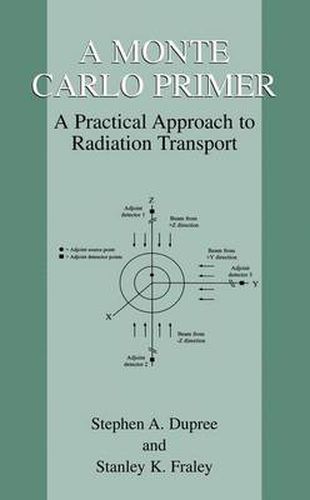Readings Newsletter
Become a Readings Member to make your shopping experience even easier.
Sign in or sign up for free!
You’re not far away from qualifying for FREE standard shipping within Australia
You’ve qualified for FREE standard shipping within Australia
The cart is loading…






This title is printed to order. This book may have been self-published. If so, we cannot guarantee the quality of the content. In the main most books will have gone through the editing process however some may not. We therefore suggest that you be aware of this before ordering this book. If in doubt check either the author or publisher’s details as we are unable to accept any returns unless they are faulty. Please contact us if you have any questions.
This text introduces the reader to the use of Monte Carlo methods for solving practical problems in radiation transport, and should also serve as a reference work for practitioners in the field. It assumes the reader has a general knowledge of calculus and radiation physics, and a knowledge of Fortran programming, but assumes no prior knowledge of stochastic methods or statistical physics. The subject is presented by a combination of theoretical development and practical calculations. Because Monte Carlo methods are closely linked to the use of computers, from the beginning the reader is taught to convert the theoretical constructs developed in the text into functional software for use on a personal computer. Example problems provide the reader with an in-depth understanding of the concepts presented and lead to the production of a unique learning tool, a probabilistic framework code that models in a simple manner the features of production of Monte Carlo transport codes. This framework code is developed in stages such that every function is understood, tested, and demonstrated - random sampling, generating random numbers, implementing geometric models, using variance reduction, tracking particles in a random walk, testing the thoroughness with which the problem phase space is sampled, scoring detectors, and obtaining estimates of uncertainty in results. Advanced topics covered include criticality, correlated sampling, adjoint transport, and neutron thermalization. Monte Carlo codes can produce highly precise wrong answers. The probability of this occurring is increased if production codes are run as opaque, black boxes of software. This text attempts to make Monte Carlo into a comprehensible, usable tool for solving practical transport problems.
$9.00 standard shipping within Australia
FREE standard shipping within Australia for orders over $100.00
Express & International shipping calculated at checkout
This title is printed to order. This book may have been self-published. If so, we cannot guarantee the quality of the content. In the main most books will have gone through the editing process however some may not. We therefore suggest that you be aware of this before ordering this book. If in doubt check either the author or publisher’s details as we are unable to accept any returns unless they are faulty. Please contact us if you have any questions.
This text introduces the reader to the use of Monte Carlo methods for solving practical problems in radiation transport, and should also serve as a reference work for practitioners in the field. It assumes the reader has a general knowledge of calculus and radiation physics, and a knowledge of Fortran programming, but assumes no prior knowledge of stochastic methods or statistical physics. The subject is presented by a combination of theoretical development and practical calculations. Because Monte Carlo methods are closely linked to the use of computers, from the beginning the reader is taught to convert the theoretical constructs developed in the text into functional software for use on a personal computer. Example problems provide the reader with an in-depth understanding of the concepts presented and lead to the production of a unique learning tool, a probabilistic framework code that models in a simple manner the features of production of Monte Carlo transport codes. This framework code is developed in stages such that every function is understood, tested, and demonstrated - random sampling, generating random numbers, implementing geometric models, using variance reduction, tracking particles in a random walk, testing the thoroughness with which the problem phase space is sampled, scoring detectors, and obtaining estimates of uncertainty in results. Advanced topics covered include criticality, correlated sampling, adjoint transport, and neutron thermalization. Monte Carlo codes can produce highly precise wrong answers. The probability of this occurring is increased if production codes are run as opaque, black boxes of software. This text attempts to make Monte Carlo into a comprehensible, usable tool for solving practical transport problems.